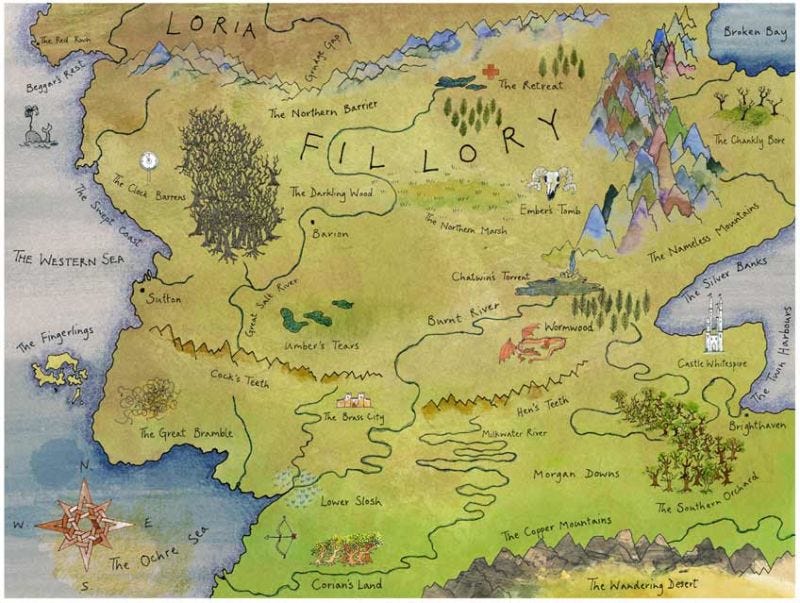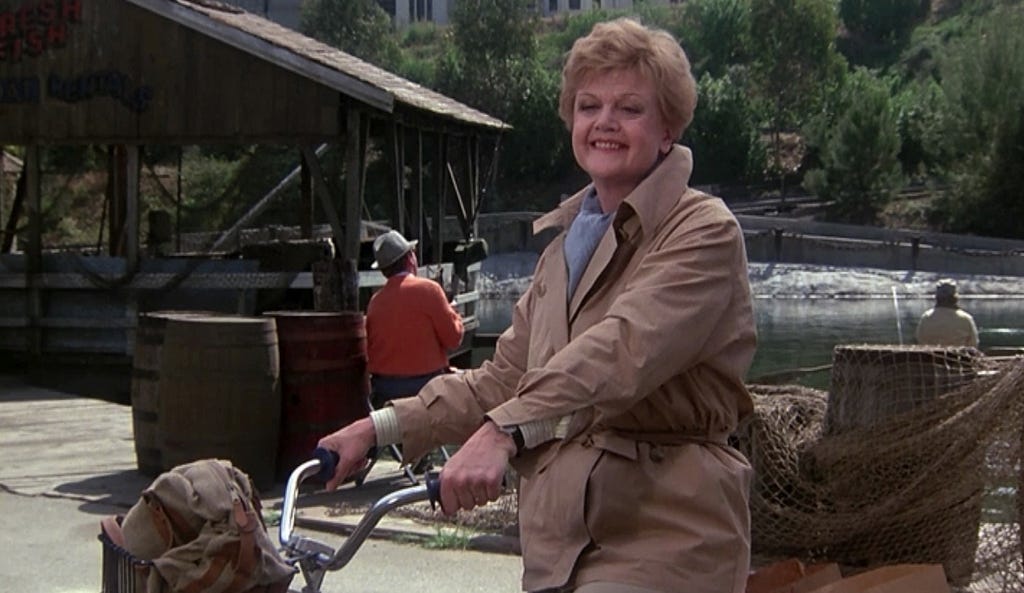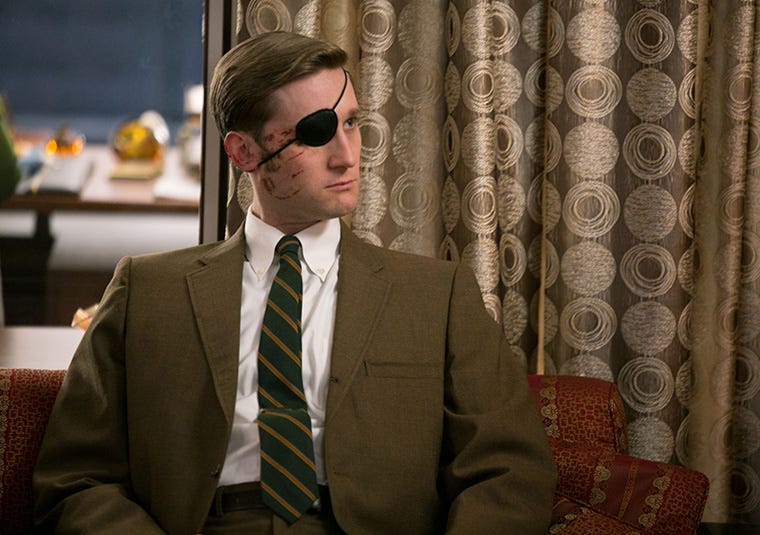Books & Culture
Who Is the Best Fake Novelist on TV?
TV is lousy with fake novelists. We’re handing out a fake Pulitzer.

At Electric Literature, we spend a reasonable amount of time (a lot) discussing literary companions to various TV shows and limited series, scouring imdb to figure out which of our favorite authors have development deals with HBO, and breaking down all the best books being adapted for the screen. But there’s one important question we’ve yet to address, a question that’s just begging for an exhaustive, deadly serious analysis featuring career breakdowns, video evidence and of course references to the almighty text…
Who is the best fake novelist on TV?
Television loves a good author-character, preferably one who drinks, smokes and is repulsed by Los Angeles and/or New York but nonetheless makes liberal use of the sexual opportunities afforded by those cities. (On a related note — prepare for a litany of white men ahead. TV is still pretty convinced that’s what an author looks like.) A fake novelist is a handy device. Need a high-brow veneer for your murder mystery? You got it. Want a haughty artist to scold your bourgeois characters for their trivial ways? Done. Want somebody to sell out? That’s what every novelist is always waiting to do!
TV is currently flush with authors: fake crime writers, fake romance novelists, fake eroticists, fake whatever-the-hell-that-guy-on-House-of-Cards-is. Each has his or her literary merits, but we need more. We need a winner.
This is a competition broken down into three categories, each analyzed and rated on a scale of 1–10 by our literary scientists, then tabulated by professionals at the storied Boston accounting firm of Norm Peterson, CPA.
The categories:
- Quality of Prose — This is the most essential question, first among equals for our purposes. How good is the writing? Is it really good or just ‘this is how a literary novel sounds’ good? Since both criteria are currently accepted in the book world, both will accepted in the fake book world.
- Zeitgeist — Is your work popping off right now? Or are you stuck on zombies and vampires? Are you writing about apocalpyses when the rest of the book world has moved onto near-future authoritarian dystopias?
- Literary Trappings — Do you live like a novelist should? (Drugs, sex, murder, cussin’ out philistines, writing longhand, wearing blazers, etc.)
Now that the rules are laid out, let’s get to the contenders. Call it the Fake Pulitzer. The Fake National Book Award. Slap a sticker on somebody’s book cover. This is the fake prize the bookish TV masses have been clamoring for.
THE CONTENDERS
Noah Solloway, The Affair (Showtime)

The Literary Bona Fides
Solloway’s evocatively-titled novel, A Person Who Visits a Place, was largely ignored by critics and readers alike, but that was before he went to Montauk. Descent, Solloway’s follow-up, is an erotic thriller based on his sexual misadventures in the eastern tip of Long Island. While Descent caused some — let’s say — tension in Solloway’s personal life (what really happened that summer on the shore, McNulty???), it also brought him the literary celebrity he so desperately craved. He transformed into “the new bad boy of American letters,” the one Jonathan Franzen was dying to meet, the PEN-Faulkner nominee, the (spoiler coming)…convicted manslaughterer. His next novel, presumably underway in the big house, is historical fiction.
How about some excerpts?
From Descent:
— “He lifted her skirt just an inch. He paused. They listened together to the sounds of the marina, hearts shaking in their skin.”
— “She was sex. The very definition of it. She was the reason the word was invented. No marriage, no matter how strong, could survive her.”
How does he rate?
Quality of Prose: 4 (Wait, where is the heart shaking? In THEIR SKIN?!?)
Zeitgeist: 6 (Sexually charged thrillers are timeless, but not all that timely.)
Literary Trappings: 8 (‘He was a novelist. The very definition of it…’)
Jimmy Shive-Overly, You’re the Worst (FXX)

The Literary Bona Fides
Jimmy’s debut novel, Congratulations! You’re Dying, received a lukewarm critical reception and quickly made its way to remainder tables. After struggling with his sophomore effort for years, the young LA-based author finally decided to pursue a lifelong dream (his true vocation, it seems) by writing “the first truly literary erotic novel since Portnoy’s Complaint.” That book, titled The Width of Peaches, has yet to be released, but early readers are turned on and singing its praises. The author has described the story as addressing “the very concept of the familial paradigm in art,” meaning it’s about incest — a steamy love affair between half-siblings. The ultimate taboo.
How about some excerpts?
From The Width of Peaches
— “As Malcolm bent the 17-year-old Sally over the lip of his tanker desk, he thought back to her baptism. That summer’s day in ’73, every car radio blaring ‘Search and Destroy,’ a warm rain lashing down like sweat flinging off a groupie’s bouncing tits.”
— “Simon and Kitty stood before Pauline’s crumbling fieldstone marker. Moments later, in a nearby crypt, Simon repeatedly plunged into Kitty, the sounds of their passion mixing with the wet summer air and the cicadas’ desperate, deafening, doomed song.” [*the end*]
How does he rate?
Quality of Prose: 7 (the English have mastered the fundamentals of prose)
Zeitgeist: 7 (literary erotica is the new monster-gothic; incest is evergreen)
Literary Trappings: 8 (Drinking, drugs. LA-hate. Self-regard. Misanthropy.)
Nick Miller, New Girl (FOX)

The Literary Bona Fides
Miller’s writing career got off to a bumpy start with the long-gestating, now (presumably) abandoned draft of Z is for Zombie, a post-apocalyptic zombie novel notable for its various misspellings of the word “rhythm” (admittedly not an easy word) and a mid-narrative word search containing no words. But Miller’s second effort, while not yet acquired by a publisher, is being hailed by advance readers as a literary achievement of the first order. The Pepperwood Chronicles is about “a hardboiled Chicago cop turned New Orleans detective.” His adventures include swamp boats, food and women.
How about some excerpts?
From The Pepperwood Chronicles:
— “Julius Pepperwood loves three things in his life: his gumbo, his sex, and more of that sweet gumbo.”
— “The sun baked down on Pepperwood’s back as he moved over to the St. Charles Street Car. The driver handed him a brown paper sack. Without opening it, Pepperwood knew what was inside: blood-soaked beignets.”
From Z is for Zombie:
— “No one in the sleepy mountain town of Rithem City knew what the meteor meant, but the one thing Mike Jr. did have was a whole lot of rittem. Whoa, what bit me in the face?’ Mike Jr. said to his dad Mike Sr., who sucks.”
From Miller’s break-up poetry chapbook:
— “Shall I compare thee to a summer’s day? No, a summer’s day is not a bitch.”
How does he rate?
Quality of Prose: 7 (Melville & Miller — masters of the first sentence)
Zeitgeist: 8 (a shrewd move from zombies to crime)
Literary Trappings: 6 (points for owning a bar, living with roommates)
Tom Yates, House of Cards (Netflix)

The Literary Bona Fides
Yates is the author of the cult classic Scorpio, which was based in part on the stories older men told him during his time as a prostitute. Other publications include God’s Cauldron (unrelated to prostitution) and some super-intense online game reviews that apparently caught the eye of gamer-and-murderer-in-chief, Frank Underwood. Yates’ latest work is a Presidential commission. The pitch was a classic publishing gambit: a vaguely fictionalized bildungsroman that wins popular support for the President’s struggling jobs program. (Seems like Random House trots that one out every four years.) Unfortunately, Yates’ novel — the first chapter anyway — cut too deep, focusing on the troubled relationship of the President and the First Lady, and was promptly canned by its fearsome, audience-addressing patron.
How about some excerpts?
From Yates’ untitled Presidential novel:
— “The Fourth of July means nothing anymore. Overcooked hotdogs and fireworks that always leave you disappointed, bite size American flags made in China waved half-heartedly by five year olds who’d rather be playing Minecraft. But the third of September, that’s a date which matters. It’s the day, three decades past, that a redneck from Gaffney married a debutante from Dallas. And the Earth’s axis tilted that day. Though neither they, nor we, knew it at the time.”
— “Here’s a woman who describes her vows as a suicide flirting with a bridge’s edge, and a man who wears his wedding ring as a badge of shame, for the debutante deserved more. But truly, what more could she desire? Together, they rule an empire without heirs. Legacy is their only child.”
From Yates’ review of the game “Monument Valley”:
— “Whoever you are, whoever you think you are, believe that you’re also a silent princess. Your name is Ida. Your journey is one through a forgotten landscape of twisting staircases and morphing castles, atop floating stones defiantly crossing an angry sea, within dimly-lit caverns cobwebbed with ruins M.C. Escher could only grasp at in a dream state.”
How does he rate?
Quality of Prose: 3 (if only he were a silent princess named Ida)
Zeitgeist: 1 (unless and until WPA fiction finally hits it big)
Literary Trappings: 8 (props for career as a listening prostitute)
Jane Villanueva, Jane the Virgin (CW)

The Literary Bona Fides
Villanueva is an aspiring romance novelist and will become a published one come hell or high water. (The last we heard, the goal was a draft before the birth, but that has to be out-of-date by now.) We don’t know a great deal about Jane’s text, but we do know a little about her tastes. First, she’s a traditionalist and believes in the sanctity of genre customs. Second, her favorite authors: Amanda Elaine (played by Jane Seymour) Angelique Harper (Kathleen “Bird” York). Third, she’s gunning for an MFA and already has experience with cloying writing groups. All in all, it’s a promising start.
How about some excerpts?
No excerpts, but a nice line from a death scene:
— “You are my flesh and blood. Nothing you could do is unforgivable to me.”
How does she rate?
Quality of Prose: 7 (understated, from the heart — that’s the stuff)
Zeitgeist: 6 (romance is due for a moment, we’ve forgotten how to love)
Literary Trappings: 7 (never a dull moment)
Christopher Plover, The Magicians (Syfy)

The Literary Bona Fides
Plover is the author of the Fillory and Further series, which follows the Chatwin children through a grandfather clock and into an alternate world of magical adventures. There are five known volumes in the series — The World in the Walls, The Girl who Told Time, The Flying Forest, The Secret Sea and The Wandering Dune — as well as a long-rumored, recently discovered sixth book called (wait for it…) The Magicians. Plover was a rough contemporary of JRR Tolkien, and while his fame and reputation never quite reached Lord of the Rings level, the students of Brakebills College for Magical Pedagogy (whose publishing imprint puts out Plover’s books) are really into the series. (Mind you, this information is mostly from the books, rather than the show. For much more, check out Andrew Liptak’s biography of Plover in Gizmodo.)
How does he rate?
Quality of Prose: 8 (Brakebills students are a shrewd readership)
Zeitgeist: 8 (our society must retreat deeper and deeper into fantasy)
Literary Trappings: 5 (points for tweed)
And the Fake Pulitzer Goes To…
Jimmy Shive-Overly
Shive-Overly gets the nod, with Plover, Villanueva and Miller rounding out the 2017 shortlist. Jimmy is the quintessential young novelist: eccentric, self-involved, a little frowzy, obsessed with the progress of his own career and fascinated by incest. The Width of Peaches is a savvy move — following-up a middling literary debut with a genre novel is a tried-and-true maneuver. He chose the right genre, too. American letters is in desperate need of an erotic revival, and Shive-Overly has come through with a “masterpiece of multi-generational sexploitation literature.” (Think, García Márquez meets Cinemax.) His career is about to take off, and the Fake Pulitzer loves to catch an author on the rise. Who knows, a few more seasons (er…books) as powerful as the last and Shive-Overly may be poised to join the fake canon.
Yes, there’s a canon.
THE HALL OF FAME
Ah, the annals of Fake Pulitzers-past. These authors need no introduction, but we will provide you with some choice excerpts from their finest works.
Hank Moody, Californication (Showtime)

Bona Fides: Author of South of Heaven, Seasons in the Abyss, God Hates Us All, Fucking and Punching, Lew Ashby: A Biography, and Californication
From God Hates Us All (a book Showtime went to the trouble of publishing):
— “Good morning, Hell-A. In the land of the lotus-eaters, time plays tricks on you. One day you’re dreaming, the next, your dream has become your reality. It was the best of times. If only someone had told me. Mistakes were made, hearts were broken, harsh lessons learned. My family goes on without me, while I drown in a sea of pointless pussy. I don’t know how I got here. But here I am, rotting away in the warm California sun. There are things I need to figure out, for her sake, at least. The clock is ticking. The gap is widening.”
— “I pop a cassette into the Buick’s stereo. It’s the Ramones. I turn the volume up high and roll down the windows. The highway air tastes of fumes, but it still feels goddamn good to breathe.”
Jessica Fletcher, Murder She Wrote (CBS)

Bona Fides: Author of many, many mystery novels. Solver of crimes.
From A Story to Die For (look, we’ve never actually seen Murder She Wrote, and from the video evidence it seems Jessica Fletcher is speaking these words extemporaneously at a writing workshop, but it’s a taste of her style)
— “But because I’m a romantic I still believe that we have the potential to be nobler than we know and better than we think. That the darkness I’ve seen is only a shadow on the potential of the human heart. Warren, in his own way a romantic, made hard by the world around him until he finally made a tragic mistake. He walked away from his own moral compass.”
Lucas Scott, One Tree Hill (CW)

Bona Fides: Author of An Unkindness of Ravens and The Comet
From An Unkindness of Ravens:
“Suddenly, it was as if the roar of the crowd, the echo of the final buzzer, the cheers of my teammates were all sounding from a thousand miles away. And what remained in that bizarre, muffled silence was only Peyton, the girl whose art and passion and beauty had changed my life. At that moment, my triumph was not a state championship, but simple clarity.”
From The Comet:
— “It was more than just a comet because of what it brought to his life: direction, beauty, meaning. There were many who couldn’t understand, and sometimes he walked among them. But even in his darkest hours, he knew in his heart that someday it would return to him, and his world would be whole again… And his belief in God and love and art would be re-awakened in his heart.”
From the show’s theme song (presumably penned by Scott):
— “I ain’t trying to be anything other than what I been trying to be lately.”
Ken Cosgrove, Mad Men (AMC)

Bona Fides: Author of “Tapping a Maple on a Cold Vermont Morning” and “The Punishment of X-4”; ad man, wearer of patches
From “Tapping a Maple on a Cold Vermont Morning” (actually published):
— “First came finding the trees. We had tagged them that summer — loops of red twine, tied tightly around craggy trunks — when Fitz had been home, when the chill of winter had seemed distant and unthinkable.”
— “What would happen, I wondered, if we did not come back, one day soon, to collect it? What if the sap hardened? What if it became frozen — not just in the frigid air, but in time, sealing its secrets in a golden egg of amber?”
The plot of “The Punishment of X-4,” as described by Mrs. Cosgrove:
— “There’s this bridge between these two planets and thousands of humans travel on it every day, and there’s this robot who does maintenance on the bridge. One day he removes a bolt, the bridge collapses, and everyone dies.”









